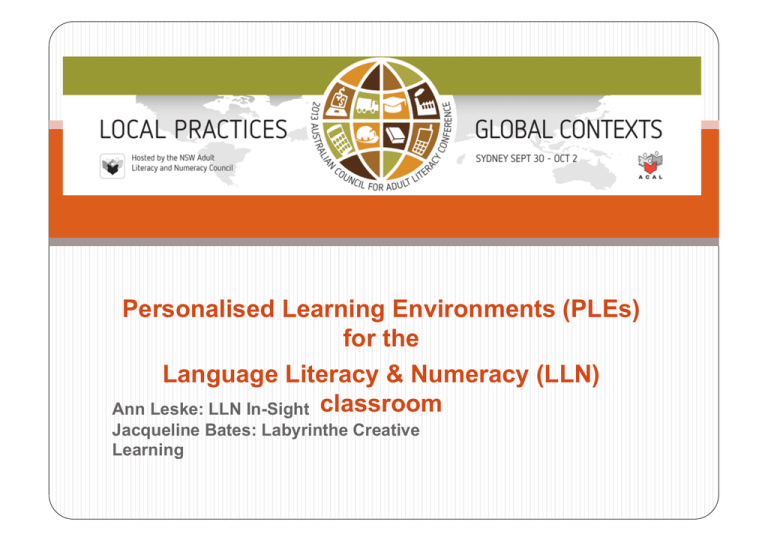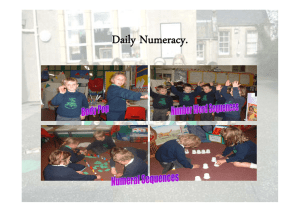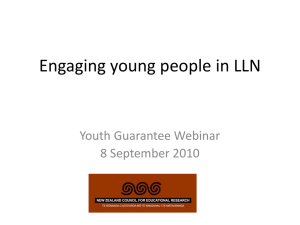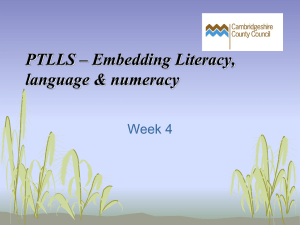LLN - ACAL
advertisement

Personalised Learning Environments (PLEs) for the Language Literacy & Numeracy (LLN) Ann Leske: LLN In-Sight classroom Jacqueline Bates: Labyrinthe Creative Learning Embedding LLN in vocational and workplace training Context: Personalised Learning Environments (PLE) PLEs to support LLN learners Introduction Ann Leske: The LLN classroom context Foundation Skills Embedding LLN & VET Jacqueline Bates: Personalised Learning Environments Personal Learning Environments explained Why social learning? Jacqueline Bates www.labyrinthe.com.au Skills for prosperity Embedding LLN and VET under the Spotlight LLN + Vocational skills taught together Driving forces behind the Australian Government National Foundation Skills Strategy for Adults 2012 Industry Skills Council s Australian Industry Group Australian Government (COAG) ABS ALLS Survey 2006 Foundation Skills Australian Core Skills Framework Employability Skills Learning Communication Numeracy Teamwork Reading Problem solving Writing Initiative and enterprise Oral communication Planning and organising Digital Technology Self management Learning Foundation Skills Training Package FSK 2013 Embedding LLN relates to how literacy and numeracy teaching is organised One size does not fit all (Zepke 2011, Rogers and Kramer, 2008)) ‘Embedding’ is not understood in just one way (Casey et al 2006) Needs to be ‘built in’ not ‘bolted on’ to programs ( Zepke 2011, p. 175 referring to Millar and Falk 2002, Wickert and McGuirk 2005; Rogers and Kramer 2008) Conception of literacy and numeracy makes a Human capital Social practice difference toapproach implementation (Zepke approach 2011, p,182) Functional skills Critical, social, human capital focus at same time - functional skills are one element Knowing the LLN demands Knowing the learners’ LLN goals Knowing what to do Click to access full infographic presentation PLEs in Practice What does embedding mean to you? What does embedding mean to you? PLEs in Practice Why edmodo? PLEs in Practice Embedding numeracy Embedding numeracy example PLEs in Practice How have you assessed LLN outcomes? References Emergence of ‘Foundation Skills’ Australian Bureau of Statistics, 2006. Adult Literacy and Life Skills Survey http://www.abs.gov.au/AUSSTATS/abs@.nsf/DOSSbytitle/ 2D7F8204FEA1D124CA2572E9008079F1?OpenDocument viewed 26/9/13 Australian Industry Group, 2012. When words fail – national workforce literacy project 2012. The Australian Industry Group. Industry Skills Council, 2010. Five good reasons. Commonwealth of Australia Industry Skills Council, 2011. No more excuses. Commonwealth of Australia SCOTESE, 2012 . National foundation skills strategy for adults. Commonwealth of Australia References Embedding LLN Black, S. & Yasukawa, K, 2010. Time for National Renewal: Australian adult literacy and numeracy as ‘foundation skills’ Literacy and Numeracy Studies Vol 18 No 2 2010 Black, S, Yasukawa, K & Brown, T, 2010. Investigating the ‘crisis’: production workers’ literacy and numeracy practices. NCVER Black, S & Yasukawa, K 2011. Beyond deficit approaches to teaching and learning: Literacy and numeracy in the VET context. University of Technology, Sydney NSW, Australia Casey, H, O. Cara, J, Eldred, S. Grief, R., Hodge, R. Ivanic, et al 2006. You wouldn’t expect a maths teacher to teach plastering: Embedding literacy language and numeracy in post-16 vocational programs – the impact on learning and achievement. London: The National Research and Development Centre for adult literacy and numeracy Zepke, N 2011. If ‘one size does not fit all’ when embedding adult literacy in the workplace, how can we identify what works? School of Education Studies, Massey University, Palmerston North, New Resources Introduction to Ann Leske LLN In-Sight What does embedding mean to you? Why edmodo? Embedding numeracy example How have you assessed LLN outcomes? LLN In-Sight Ann Leske LLN-Insight M.Ed B.Ed TAE NCVER CoP Associate Lecturer CSU LLN Consultant and Teacher annleske@comcen.net.au 0437030543


